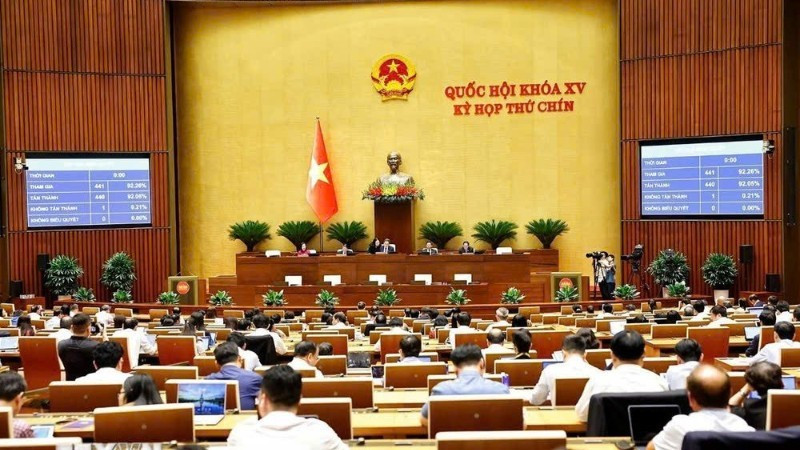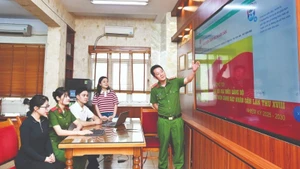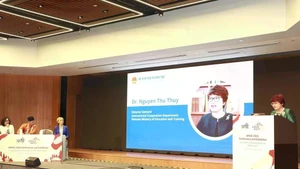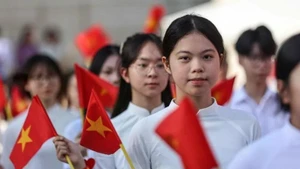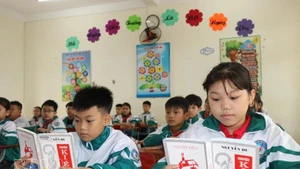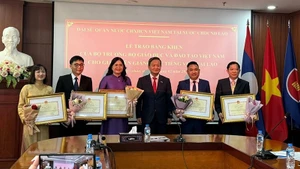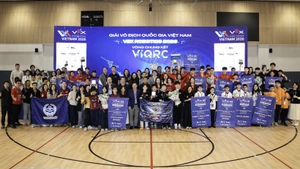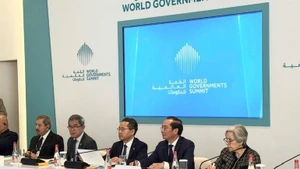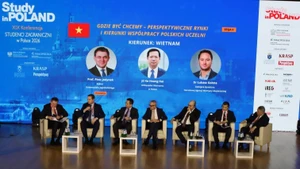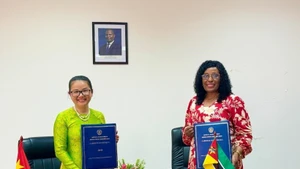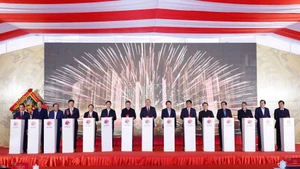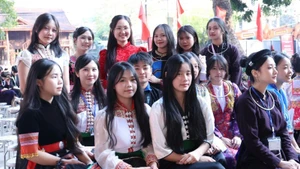During its 9th session, the 15th National Assembly passed Resolution No. 217/2025/QH15 (Resolution 217) on June 26, 2025, concerning tuition waivers and support for preschool children, school students, and learners enrolled in general education programmes at institutions within the national education system. This resolution stands as a key development, reflecting the superiority of Viet Nam’s educational policy and fulfilling long-held public expectations.
Throughout the 80-year history since the country’s founding, education has consistently been a top priority in the policies of the Party and the State.
In 1945, after achieving independence, despite the many hardships facing the young Democratic Republic of Viet Nam, President Ho Chi Minh emphasised the importance of eradicating illiteracy, viewing education as a key to raising intellectual standards, developing human resources, and nurturing talent.
He declared that “education is a cause of the masses,” stressing that regardless of age, gender, or background, every Vietnamese citizen must engage in learning and contribute to eliminating illiteracy, because “only by continuously studying can one make continual progress.”
Article 61 of the 2013 Constitution states: “1. Education development is the top national policy to enhance intellectual standards, develop human resources, and nurture talent. 2. The State prioritises investment and encourages other sources of investment in education; cares for early childhood education; guarantees compulsory primary education free of charge; gradually universalises secondary education; develops higher education and vocational training; and implements reasonable scholarship and tuition policies…”
Article 15 of the 1946 Constitution declared: “Primary education is compulsory and free of charge (...) Poor students are assisted by the Government.”
By the time of the 2013 Constitution, education policies had continued to evolve and improve with significant advancements. Article 61 reaffirms: “1. Education development is the top national policy to enhance intellectual standards, develop human resources, and nurture talent. 2. The State prioritises investment and encourages other sources of investment in education; cares for early childhood education; guarantees compulsory primary education free of charge; gradually universalises secondary education; develops higher education and vocational training; and implements reasonable scholarship and tuition policies…”
Tuition waiver and support policies were concretised in the 2019 Education Law: “The State shall have policies for subsidies, tuition waivers, and reductions for learners who fall under social policy categories, ethnic minorities in especially disadvantaged socio-economic areas, orphans, abandoned children, people with disabilities, and those from poor and near-poor households” (Clause 2, Article 85).
Through successive Party Congresses, the Communist Party of Viet Nam has consistently directed the implementation of compassionate educational policies, including universal primary and lower secondary education, and tuition support for disadvantaged groups.
On November 4, 2013, the Party Central Committee issued Resolution No. 29-NQ/TW on the fundamental and comprehensive reform of education and training to meet the demands of industrialisation and modernisation within the socialist-oriented market economy and international integration (Resolution 29). It set goals to complete universal early childhood education for five-year-olds by 2015, enhance the quality of universal education in subsequent years, and implement free tuition before 2020.
To implement the Party’s resolutions and documents on education, including tuition-related issues, the Government on August 27, 2021 issued Decree No. 81/2021/ND-CP regulating tuition collection and management mechanisms in public educational institutions and policies on tuition waivers, reductions, and support for learning expenses; as well as pricing in the education and training sector.
Accordingly, starting September 1, 2024, five-year-old preschoolers are eligible for tuition waivers. Responding to new demands, on August 12, 2024, the Politburo issued Conclusion No. 91-KL/TW to continue implementing Resolution 29, which outlined the need to promptly adjust and increase State budget expenditure on education and training in line with economic growth; ensure funding for compulsory and universal education, tuition waivers for five-year-old preschoolers, and other key educational initiatives; and prioritise investment in education in ethnic minority, mountainous, border, and island areas. It also called for improved student support policies using State budget through scholarships or tuition waivers and reductions.
At its meeting on February 28, 2025, after reviewing the Government’s financial capacity report regarding organisational streamlining of the political system, the Politburo decided to waive tuition fees nationwide for students from preschool to the end of upper secondary education in public institutions, starting from the 2025–2026 academic year.
Prior to this, many provinces and cities had already piloted tuition waivers for preschool and school students using local budgets. Most recently, during the 9th session of the 15th National Assembly, Resolution 217 was officially adopted.
From the 2025–2026 academic year, all preschool children, school students, and learners enrolled in general education programmes at public institutions across the country will benefit from tuition waivers. Additionally, those attending semi-public and private institutions will receive tuition support.
The support amount will be determined by the provincial or municipal People’s Councils based on a tuition framework set by the Government but shall not exceed the tuition rates charged by private or semi-public educational institutions.
This policy applies to Vietnamese citizens and persons of Vietnamese origin residing in Viet Nam without confirmed nationality, and learning at educational institutions within the national education system.
This demonstrates that at every stage, based on practical circumstances, the Party and the State have devised appropriate policies that meet the needs and aspirations of the people.
According to statistics from the Ministry of Education and Training, there are currently about 23.2 million students nationwide, including 21.5 million in public institutions and 1.7 million in non-public institutions.
Implementing tuition waivers for public schools and tuition support for private schools will significantly reduce the financial burden on millions of families.
Tuition waivers and support are not merely socio-economic policies but long-term development strategies, a progressive shift in the understanding of the State’s role as both a facilitator and a servant of the people. In this decision, we can see the broad consensus from top to bottom, from leadership to legislative and executive bodies, and even more importantly, among the people.
(Dr. Nguyen Si Dung)
It is also worth highlighting that Viet Nam is currently the only country in ASEAN to offer tuition waivers from preschool through upper secondary education. Resolution 217 was warmly welcomed and highly praised by the public upon its issuance.
Dr. Nguyen Si Dung commented: “Tuition waivers and support are not merely socio-economic policies but long-term development strategies, a progressive shift in the understanding of the State’s role as both a facilitator and a servant of the people. In this decision, we can see the broad consensus from top to bottom, from leadership to legislative and executive bodies, and even more importantly, among the people.
We are on the right path: using institutions to unlock resources, using those resources to invest in people, and using people to build the future.”
In a deliberate attempt to obstruct the implementation of a humane and correct policy and to hinder Viet Nam’s development, hostile and reactionary forces have falsely claimed that tuition waivers are not new and fail to address the root of educational inequality, calling the policy a “populist ploy.” They have also argued that the policy is unfeasible due to budget constraints and spread misinformation that Viet Nam waives tuition only to increase other fees.
Some have even distorted the policy by claiming it causes inequality between school types, with public school students enjoying full waivers while private school students only receive partial support.
In reality, Resolution 217 was passed with overwhelming support and a clear, well-defined implementation roadmap, demonstrating the Party and State’s strong political will.
Regarding funding sources, on May 17, 2025, the National Assembly approved Resolution No. 196/2025/QH15 to adjust and supplement the 2025 State budget. It agreed to reallocate 6.62 trillion VND (251.5 million USD) of the unused 2024 central regular expenditure budget to 2025 for implementing the tuition waiver policy and addressing tasks arising from the restructuring and streamlining of State institutions as approved by competent authorities.
The Government also outlined a long-term roadmap with a total budget of 30.6 trillion VND (1.16 billion USD), ensuring the feasibility of Resolution 217.
Regarding tuition support for preschool children, school students, and learners in private and semi-public institutions, Resolution 217 clearly states: “The level of tuition support shall be decided by the provincial or municipal People’s Councils according to the tuition framework set by the Government but shall not exceed the tuition fees of private and semi-public educational institutions,” thus eliminating inequality.
Tuition collection in educational institutions is closely monitored by the authorities, with strengthened inspection and enforcement mechanisms against violations. At the same time, communication is being enhanced to ensure that parents comply with the regulations. There is no truth to claims that tuition waivers are offset by increased unofficial fees, as alleged by malicious actors.
To prevent misleading and toxic information from influencing public sentiment and policy execution, relevant authorities must provide timely, transparent, and accurate information to the public.
In addition, every individual, especially families with members eligible to benefit from the new policy, should proactively seek official information and approach competent authorities for clarification when in doubt, avoiding the spread of unverified or false information on social media.
